Politics
Keir Starmer to face PMQs as reports claim Treasury must fill ‘£40bn funding gap’ in budget – UK politics live | Politics
Treasury minister Darren Jones warns of ‘hard’ choices in budget, but says change will bring ‘better public services’
Darren Jones, the chief secretary to the Treasury, has described today’s fall in inflation (see 9.36am) as “welcome news”. But, in interviews, he also warned there would be “hard” choices in the budget.
Asked whether he could rule out real-terms spending cuts for crucial public services, Jones replied:
We’re setting budgets for public services at the end of October for one financial year, 25/26.
We will not be returning to austerity and we will present an honest set of spending plans that deal with the £22bn black hole that we inherited from the previous Conservative government.
That will be hard, but it’s the right thing to do and it’s the start of the period of change under this Labour government that will see better public services over the years ahead.
UK inflation falls below 2% for first time in three and a half years
Inflation in the UK has fallen to its lowest level in three and a half years, giving a pre-budget boost to Rachel Reeves as expectations grow for the Bank of England to cut interest rates. Richard Partington has the story here.
Ben Zaranko, an economist at the Institute for Fiscal Studies, is complaining about the use of the term “black hole” in budget commentary. He posted this on social media.
I hate the term ‘fiscal black hole’. It’s especially unhelpful and confusing when it’s used interchangeably to mean both:
1) an in-year overspend (in 2024/25); and
2) the amount by which the government is on track to breach its self-imposed fiscal rule (in 2029/30)
Starmer to face PMQs as reports claim Treasury must fill ‘£40bn funding gap’ in budget
Good morning. Governments engage in expectation management, and the latest example is on the front page of the Financial Times this morning, where there is a story saying Rachel Reeves, the chancellor, has identified a “£40bn funding gap” as she prepares the budget, which is happening a fortnight today. In their story George Parker and Sam Fleming report:
UK chancellor Rachel Reeves has identified a £40bn funding gap ahead of her Budget in two weeks — far more than previously expected — as she prepares big tax rises to patch up the NHS.
The figure represents the funding that Reeves needs to protect key government departments from real-terms spending cuts, cover the enduring impact of an annual £22bn overspend and build up a fiscal buffer for the remainder of the parliament.
The Financial Times has been told by officials close to the budget process that the Treasury is seeking ways of closing a shortfall of £40bn, with tax rises set to form the centrepiece of her response.
The FT also points out that Reeves told cabinet colleagues yesterday the budget would require “difficult decisions on spending, welfare, and tax”.
A “funding gap” is what is otherwise described as a black hole in the accounts, and it can be hard to keep track of what the best black hole estimate is because the figures keep changing. Here is a quick recap.
The £22bn black hole: In a statement to MPs in July, Reeves said the Treasury had identified a £22bn gap (difference between the amount the government would have to spend, and the amount actually set aside for spending) in the in-year accounts (ie, for for the 2024-25 budget).
The £100bn black hole: At the time Reeves present the £22bn as principally a problem for the current financial year. But, as Pippa Crerar reports today, she is now telling colleagues that the £22bn gap applies in years going ahead, which adds up to a £100bn black hole over the next five years.
The up to £20bn future black hole generated by unrealistically low spending allocations for the years ahead: During the election campaign the Institute for Fiscal Studies (IFS), and other thinktanks, repeatedly warned that the pending figures set by the Tories for the next five years were implausibly low, and that in practice governments would have to spend between £10bn and £20bn a year more to stop public services collapsing. This black hole is in addition to the £22bn 2024-25 one identified by Reeves.
In an interview with the Today programme this morning, asked about the Treasury’s new £40bn funding gap figure (which government sources have confirmed to the BBC), Paul Johnson, director of the IFS, did not dispute the figure. He said that a “significant amount of additional tax” would be needed, but he said he did not expect taxes to rise by £40bn a year. He said:
If we get tax rises on that scale [£40bn], that really would be extraordinary, I mean unprecedented. That would be tax rises sort of three times as big as George Osborne, for example, introduced back in 2010 in the depths of the aftermath of a financial crisis.
But that said that, if you are as the government wanting to not just protect public services, but significantly increase spending on the health service and increase spending on other things in line with the size of the economy, yes, there is a very big hole in the public finances.
Now, of course, we’ve always known this. We’ve had this discussion through the election, when we [the IFS] were warning that there were these problems, and Keir Starmer and others were going, ‘No, no, no, there’s no such issue’.
Now, £40 billion is a big number. You can get there relatively easily, actually, in terms of the scale of additional spending that will be required down the line. Some of that be covered by slight changes in the fiscal rules. Some of that will be covered by some of the tax rises that the Labour party are already intending. But that would still leave a significant amount of additional tax revenue required.
Figures like the £40bn one don’t end up in the FT, and on the BBC, by accident, and at this stage in the budget cycle most government budget-related communication is best understood as expectation management.
But expectation management can mean two things. It can mean exaggerating how bad things are likely to be, so that on the day voters are pleasantly surprised. But it can just mean dripping out difficult news very slowly, so that when it finally does get confirmed and announced, it is not as much as a shock as it might have been. It is hard to be sure, but what the Treasury is up to now is probably for of the latter than the former.
Here is the agenda for the day.
10.30am: Robert Jenrick, one of the two Tory leadership candidates still in the contest, is giving a speech on the economy.
Noon: Keir Starmer faces Rishi Sunak at PMQs.
After 12.30pm: MPs debate a Lib Dem opposition day motion calling for various measures to end the carer’s allowance scandal, including writing off existing overpayments.
If you want to contact me, please post a message below the line (BTL) or message me on social media. I can’t read all the messages BTL, but if you put “Andrew” in a message aimed at me, I am more likely to see it because I search for posts containing that word.
If you want to flag something up urgently, it is best to use social media. I’m still using X and I’ll see something addressed to @AndrewSparrow very quickly. I’m also trying Bluesky (@andrewsparrowgdn) and Threads (@andrewsparrowtheguardian).
I find it very helpful when readers point out mistakes, even minor typos (no error is too small to correct). And I find your questions very interesting too. I can’t promise to reply to them all, but I will try to reply to as many as I can, either BTL or sometimes in the blog.
Politics
Trump accuses UK’s Labour Party of ‘foreign interference’
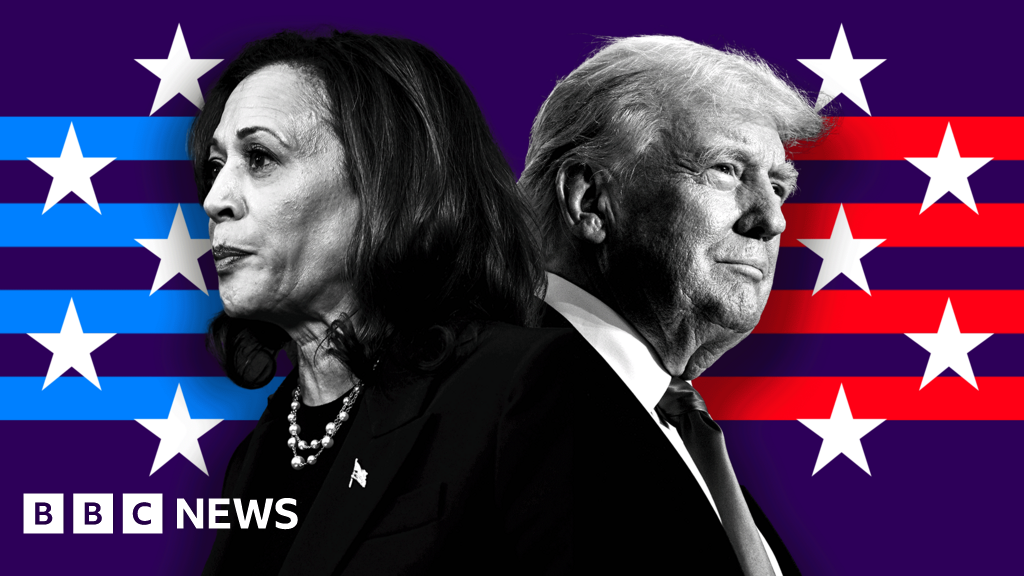
Donald Trump’s campaign has filed a Federal Election Commission (FEC) complaint against the UK’s Labour Party, accusing it of “blatant foreign interference” in the US election in aid of the Harris-Walz campaign.
The complaint cites media reports about contact between Labour and the Harris campaign, as well as apparent volunteering efforts, arguing that this amounts to illegal “contributions”.
The BBC understands that Labour activists campaigning in the US presidential election are doing so in a personal capacity.
The Labour Party has not issued an official response.
Specifically, the complaint cites newspaper reporting that Labour-linked individuals have travelled to the US to campaign for Harris.
That reporting, the complaint alleges, creates a “reasonable inference that the Labour Party has made, and the Harris campaign has accepted, illegal foreign national contributions.”
The letter refers to Washington Post reporting that communications were exchanged between the parties and that senior officials have met in private.
Additionally, the complaint cites a social media post on LinkedIn in which a Labour staff member said that “nearly 100” current and former party members will be headed to battleground states in the US.
The post, from Labour Party head of operations Sofia Patel, added that 10 “spots” are available and that “we will sort your housing”.
It appears to have since been deleted.
The complaint makes comparisons to an international programme in 2016 in which the Australian Labor Party, or ALP, sent delegates to help with Bernie Sanders’ campaign.
In that instance, however, the ALP paid for flights and daily stipends. The party and the campaign were each handed down civil penalties of $14,500.
Labour activists’ trips were not organised or funded by the party, it is understood from party officials.
Foreign nationals are permitted to serve as campaign volunteers as long as they are not compensated, according to FEC rules.
It is considered normal for party officials from the UK to be in contact with counterparts in the US.
It also has taken place previously between the UK’s Conservative Party and US Republicans.
The BBC has contacted the Harris-Walz campaign for comment.
Politics
Starmer warns Russia attacks in Ukraine risk global food security
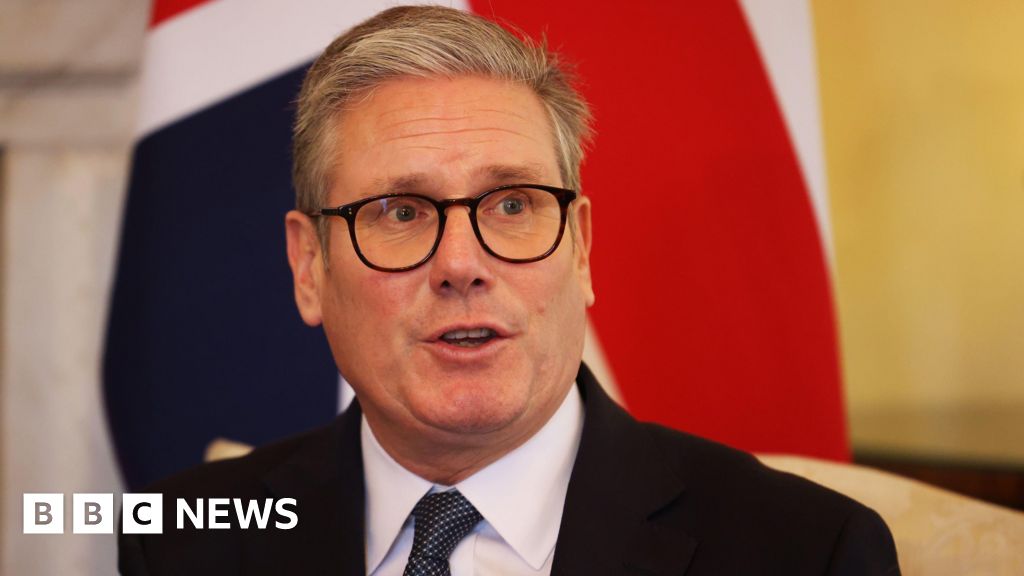
Prime Minister Sir Keir Starmer has warned that Russia is stepping up attacks on Ukrainian ports in the Black Sea – delaying the export of agricultural produce, including aid intended for Palestinians caught up in the conflict with Israel.
During several days of strikes in early October, Russian weapons hit at least four cargo ships, including one reportedly carrying 6,000 tonnes of corn.
Sir Keir said that Russia’s President Vladimir Putin was willing “to gamble on global food security in his attempts to force Ukraine into submission”.
The prime minister’s remarks came as he travels to the Pacific Island of Samoa for a meeting of Commonwealth heads of government.
During several days of strikes, Russian missile strikes on the Odesa region hit a Panamanian-registered ship and a Palau-flagged cargo ship were also attacked, killing one person on-board.
Several people in the southern city of Zaporizhzhia were injured as 29 homes were destroyed and pictures released by regional officials show a giant crater in the mud, with bricks and wood strewn all around.
A wave of strikes on Ukraine’s Black Sea ports coincided with a European tour by President Volodymyr Zelensky – who visited leaders in London, Paris, Rome and Berlin.
But Sir Keir pointed out the increasing number of Russian attacks coincided with harvest season.
Despite the war, Ukraine is still a significant supplier of agricultural goods.
But British intelligence suggests a growth in what officials call Russian “risk appetite” when attacking Ukrainian ports – with grain ships becoming what is described as “collateral damage” in Russia’s campaign.
Sir Keir said the “indiscriminate attacks” were “harming millions of vulnerable people across Africa, Asia and the Middle East”.
According to Ukrainian figures, more than 20 civilian ships have now been damaged in Russian attacks since the start of the war in 2022.
Grain silos and other port infrastructure have been badly damaged too.
However, Ukraine has succeeded in creating a maritime corridor to ensure the safety of grain exports, after Moscow pulled out of a Black Sea grain deal last year.
Some 962,000 tonnes of grain were exported in the first ten days of October, according to the agriculture ministry in Kyiv – double the volume shipped in the same period last year.
Speaking to journalists travelling with him to Samoa, Sir Keir said Russia’s recent recruitment of troops from North Korea was “an embarrassing and desperate act.
On Tuesday, the British government announced that it would give Ukraine an extra £2.26bn using the profits from Russian assets held in Europe.
The one-off payment is an addition to £3bn already pledged by the government to fund Ukraine’s war effort.
So far, the UK has given more than £12bn in military aid and has promised to match that level of support in the future.
Announcing the funding, Chancellor Rachel Reeves said it showed the UK’s support for Ukraine was “unwavering and will remain for as long as it takes”.
Politics
Kemi Badenoch hits back at Robert Jenrick’s ‘disrespectful’ jibe
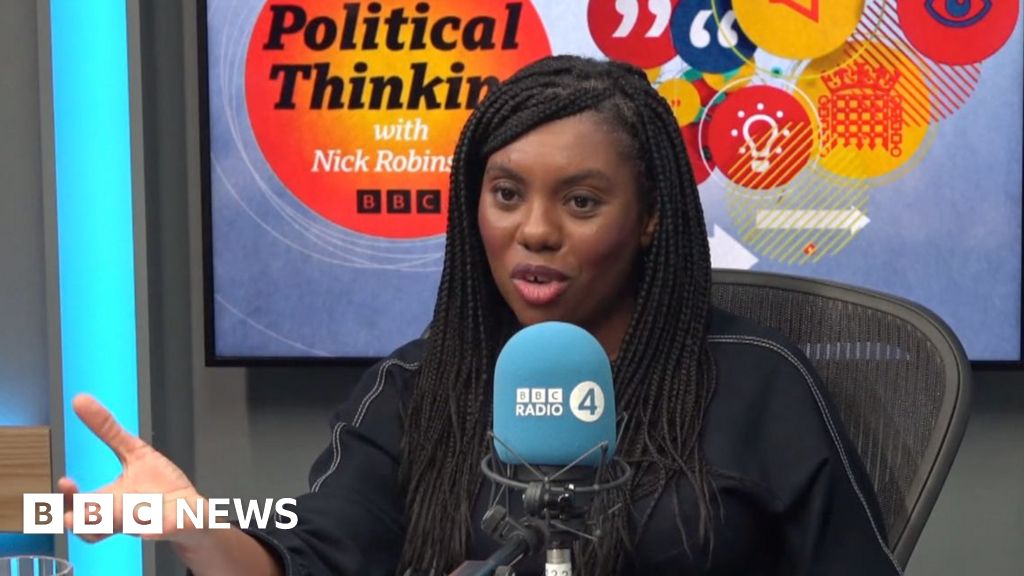
Kemi Badenoch has hit back at her Tory leadership rival Robert Jenrick’s claim that her decision not to set out detailed policies was “disrespectful” to the party’s membership.
Speaking to Political Thinking with Nick Robinson, Badenoch said she would not use that word about another candidate and that everyone had “their own campaign approach”.
“If this was a general election, yes, it would be wrong to be standing with no policies. This is not a general election,” she told Nick Robinson.
She added: “He [Jenrick] doesn’t know what he’s going to be standing on in four years’ time.”
Jenrick stood by his criticism in an interview with BBC Radio 5’s Matt Chorley.
“Kemi and I disagree on this point. I believe you have to start with principles and values, but I think that is not enough. You also have to have policies.”
He argued that the public were “deeply sceptical” of politicians and the best way to win them back was to set out policies and “lay out the trade-offs”.
“The age of policy-free politics is over,” he said, adding that it was “wrong” to ask party members to support you “on the basis of a plan for tomorrow”.
During the leadership campaign, Jenrick has said he wants to leave the European Convention on Human Rights, encourage housebuilding and oppose Labour’s plans on reaching net-zero carbon emissions.
Defending her approach, Badenoch said the party members know what her principles are. She said she would take time to design policies adding: “We have time, we don’t need to rush.”
She said she did not want to make promises “unless I know how I am going to deliver it”.
Earlier in the week, Jenrick told BBC Radio 4’s Westminster Hour: “I think it’s disrespectful to the members and the public to ask for their votes without saying where you stand on the big issues facing our country today.”
Conservative Party members are currently voting between the two candidates and a result is due on 2 November.
Unlike her rival, Badenoch has not done many media appearances, however in a wide-ranging interview she spoke to Nick Robinson about her thoughts on net-zero, immigration and Covid lockdowns.
On the environment, she said she was a “net-zero sceptic” but not “a climate change sceptic”.
She said she did not want to do something “because it looks good” and “before we figured out how to do it”.
She pointed to speeches she had made in Parliament on subject asking: “Lot’s of schoolchildren will be very happy, but where is the plan?”
She added: “Is net-zero a solution or is it a slogan… I am not sure we have properly thought that through.”
On immigration, she said “numbers matter but culture matters more”.
For several years, Conservative politicians have promised to get down the numbers coming into the country, but immigration has continued to rise, hitting record levels in 2022.
Badenoch said there should be a cap on numbers but it was also important to ensure those arriving “love British culture”.
Asked how the government should decide this, Badenoch said it was important to establish from which countries “successful migrants” were coming from.
“We should be getting to a point where we can say we’re happy to take more from countries A, B and C and for countries X, Y and Z, we’re going to have stricter rules.”
During the coronavirus pandemic, Badenoch was a Treasury minister. She said she would not apologise for spending “a lot” during Covid but added: “I think we just overran it to the point where it made inflation worse than it needed to be.”
She also said she thought the government “overdid it in terms of the length of lockdown”.
“There was a King Canute sort of situation. I thought that we were trying to do too much, that this was where government was overstretching itself and we weren’t trusting people enough.
“The biggest thing I hated was the fixed penalty notices.”
The notices were issued by the police to people who breached Covid rules, resulting in fines of between £200 and £10,000.
Both Boris Johnson and Rishi Sunak, the prime minister and chancellor during the pandemic, were issued with fines for breaching the regulations.
Badenoch said: “If Boris did not bring in those fixed penalty notices, he would not have had the Partygate scandal, certainly not to the extent that it was… he got caught in a trap that he had set for himself.”
She said Conservatives had “strayed away” from their principles of freedom.
Asked about her own leadership style, Badenoch said she aspired to be a “fun” leader and would try to bring some “humour” and “light-heartedness” to her approach.
“I think that we’ve been very gloomy. We’re not the gloomy party. We are actually quite an optimistic and fun party and I want to bring that out.”
Reflecting on her own background, she compared finding out that she was a British citizen to “finding out that you’d won the lottery”.
Badenoch explained that because she was born in Nigeria, a Commonwealth country, before a 1983 rule change, she qualified to be British – something she only found out when she was 14 years old.
She said there was a “very unpleasant sort of ethno-nationalist anti-Kemi wing” who called her an “anchor baby” – a term used in the United States to refer to people who ensure their children are born in the country in order to gain residency.
Badenoch was born in the UK because her mother had come to get medical care at a private hospital, but she said that is not why she qualifies as a British citizen.
Politics
‘Extreme wealth’ tax demanded by cross-party MPs

A dozen Labour MPs have joined a cross-party call for an “extreme wealth” tax in this month’s Budget.
The MPs have written to chancellor Rachel Reeves to demand a new 2% tax on assets worth more than £10m, which they claim could raise £24 billion per year.
The left wing Labour MPs and two Labour peers have joined forces with MPs suspended by Sir Keir Starmer, including former shadow chancellor John McDonnell, and former leader Jeremy Corybn, who was elected as an independent.
The call is also backed by the Greens, Plaid Cymru, the SDLP, Alliance and one Liberal Democrat MP.
The Labour Party has been asked for comment.
The chancellor is finalising details of her first Budget, to be announced on Wednesday 30 October. Government sources have told the BBC this will include tax rises and spending cuts to the value of £40bn.
In their letter to Reeves, the 30 MPs and peers say an extreme wealth tax is needed as billionaire wealth has increased by almost £150bn in only two years, between 2020 and 2022, but revenue from wealth taxes has remained stagnant at around 3.4%.
One of the MPs, Zarah Sultana, who represents Coventry South, flagged Oxfam research showing the richest 1% of Britons hold more wealth than 70% of the UK population.
“Austerity is, and always has been, a political choice,” she said. “It is grossly unfair that children and pensioners are being pushed into poverty while billionaire wealth continues to grow.
“We urgently need wealth taxes to rebalance power, fund essential public services and build a society where the needs of the many take precedence over the greed of a few.”
Reeves told the party’s autumn conference there would be “no return to austerity” under this government and promised a boost to government investment, designed to kickstart growth.
The MPs are also asking Reeves to equalise capital gains tax (CGT) and income tax rates in her budget.
They say this would “rectify unfairness in the tax system, where working people are subject to proportionately higher rates of tax”, and raise £16.7bn per year.
At the election, Labour promised not to increase taxes on “working people”, covering VAT (value added tax), income tax or National Insurance (NI), which limits the levers the chancellor can pull to bring cash in.
However, there has been speculation Reeves could increase CGT – charged on profits from the sale of assets like second homes – and also freeze the income tax threshold beyond 2028, potentially dragging more workers into the higher tax bands.
Sir Keir Starmer also did not rule out a National Insurance increase for employers in a BBC interview last week.
Reeves has already taken one unpopular decision, to remove winter fuel payments from 10m wealthier pensioners, which led to a rebellion by seven Labour MPs.
Sultana is one of five MPs who signed the wealth tax letter and who are currently suspended from the Labour Party for voting against the winter fuel payment cuts.
Some observers also wonder if the rebels, who were suspended for six months in July, may decide to team up with Corbyn’s independent group in January rather than re-join Labour.
The Labour rebels have teamed up with four of the smaller Westminster parties, including Wales’ Plaid Cymru and Northern Ireland’s SDLP and Alliance groups, plus all four Green Party MPs.
Green co-leader Carla Denyer called on Reeves to reconsider Labour’s decision to ditch its £28bn green investment pledge earlier this year, and invest more in public sevices.
“We cannot afford to have another government of spending cuts and economic hardship,” she said.
“Labour’s first Budget must take a resolute step to ensure that those with extreme, unprecedented levels of wealth help foot the bill.”
Politics
Sinn Féin leaders correct age of teen texted by senator on record

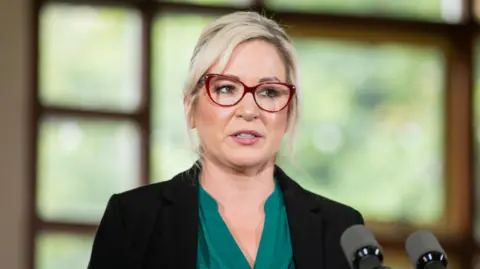 PA
PAMichelle O’Neill has corrected the record at Stormont regarding the age of the teenage boy who received inappropriate texts from the former Irish Senator Niall Ó Donnghaile.
On Monday, the first minister and Sinn Féin deputy leader told the Northern Ireland Assembly that party membership files said the boy was 17 at the time.
But the young person had said he was 16 years old.
Sinn Féin leader Mary Lou McDonald has also corrected the record officially in the Dáil (lower house of Irish parliament).
On Tuesday, O’Neill told the assembly she “fully accepted” the age and wanted to correct the information on the record.
She said it was her understanding that the young person was 17 based on the information he had provided in his application to join Sinn Féin.
She also repeated her apology to him saying she was “absolutely so sorry for the hurt caused” by the party’s statement issued following Mr Ó Donnghaile’s resignation in December 2023.
O’Neill had been facing calls to return to the assembly after the Democratic Unionist Party (DUP) submitted an urgent question.
She is also being asked to return to Stormont’s executive office committee on Wednesday for further questioning, but this has not yet been confirmed.
McDonald came to the Dáil on Tuesday to correct the record in which she previously stated the young person was 16 and apologised for her words.
“I have now written to the young person and his mother offering a full, unequivocal and sincere apology,” she said.
“What happened to this young person was wrong, Niall Ó Donnghaile’s behaviour was unacceptable, utterly inappropriate, and no young person should have experienced that.”
McDonald apologises
The Sinn Féin leader also said she was “very sorry” for the hurt the words in her statement following Mr Ó Donnghaile’s resignation.
“That was never, ever my intention, and I apologize to that young person,” she added.
McDonald said it was her understanding the teenager was 17 years old at the time of the incident “because of the information provided on his application, formally applied to join Ográ Sinn Fein, that information was wrong,” Ms McDonald said.
“The young person themselves have made clear that he was in fact 16 at the time, so I want to correct the Dáil record to reflect that he was in fact 16 years of age when the text was sent.”
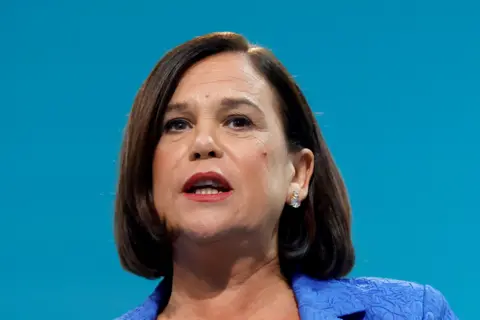 Reuters
ReutersHow did we get here?
Sinn Féin has faced criticism over the last week for its handling of the suspension and resignation of Mr Ó Donnghaile.
Mr Ó Donnghaile, a former Belfast lord mayor, was suspended by Sinn Féin over the issue but the party allowed him to resign on health grounds in 2023 without revealing the complaint against him.
Calls for clarity on the teenager’s age came following a Sunday Independent article where the boy said he was 16 at the time the texts were sent and not 17 as McDonald and O’Neill had previously said.
The message is believed to have been personal in nature but not sexually explicit.
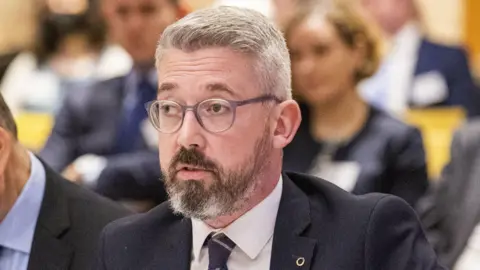 PA Media
PA MediaThe party has also been questioned over its safeguarding policies after two former press officers gave references to former colleague and convicted child sex offender Michael McMonagle.
On Monday, it emerged that a Sinn Féin employee had resigned after admitting involvement in an incident where a portrait of former DUP lord mayor Lord Browne was damaged.
Speaking at Stormont on Tuesday, the first minister said the employee was “immediately suspended” and the police have been notified.
On Monday evening, McDonald said Sinn Féin accepted the boy’s own account that he was 16 at the time.
“The person knows their age so obviously Michelle [O’Neill] is right, the party records did indicate that he was 17, it was on his application form for membership,” McDonald said.
“But that doesn’t matter now. What matters is that we respond fully to the young person in question and what matters is that the Dáil record is accurate and I will attend to both of those matters tomorrow.”
A Sinn Féin spokesperson said the party record of the boy’s age was “based on the date of birth that [he] provided on his membership documents at the time”.
The spokesperson said it had “since emerged” that the boy was 16 years old.
Politics
Inside the battle to run the Trump White House


Earlier this month, the New York Times reported that Donald Trump was considering Brooke Rollins — his former Domestic Policy Council director now serving as president of a MAGA think tank, the America First Policy Institute — to serve as his chief of staff should he return to the White House.
Within 24 hours, stories emerged that AFPI — dubbed the “White House in waiting” for its quiet role mapping out a second Trump term — had been hacked by the Chinese.
But inside Trump’s inner circle, that wasn’t exactly news: The institute’s online security perimeter had been breached almost a full year prior, then again earlier this month.
The reason news seeped out this time? Because, some Trump confidants speculate, someone who didn’t like Rollins wanted it to.
“The knife-fighting is underway,” one said. “Someone’s like, ‘Oh, she wants to be chief of staff? Well, she can’t even stop her own organization from getting hacked.’”
It’s just one vivid example of the behind-the-scenes jockeying playing out over a crucial White House role even before Trump wins the election. The chief of staff job has always been seen as particularly crucial and particularly fraught for Trump, who ground through four chiefs in four years during his first term. Each, despite wildly different styles and personalities, struggled to rein in Trump and keep him and his administration focused.
Trump himself, those around him say, has been superstitious about making plans before a victory and has been reluctant to discuss the matter much. But among those orbiting the ex-president, tongues are freely wagging.
A host of insiders view the job as crucial to a potential second Trump administration’s success — and had plenty to say about the three people most discussed for the role: Rollins, Susie Wiles and Kevin McCarthy.
The frontrunner
As de facto campaign manager, Wiles probably has the job if she wants it, almost all of the insiders said. Trump, after all, has a history of rewarding those who help him win — tapping RNC chief Reince Priebus as chief and campaign CEO Steve Bannon as chief strategist following his 2016 victory.
But that’s not the only reason people are betting on Wiles, a veteran of Florida politics who grew closer to Trump when he was persona non grata in political circles after Jan. 6.
She’s the biggest reason why Trump has a more professional and organized campaign this cycle, insiders say. They appreciate her instituting order on an otherwise chaotic political menagerie and credit her zero-tolerance policy on backbiting for an era of relative peace in their orbit.
Most importantly: The boss trusts her. While Trump doesn’t always listen, they’ve established a rapport where Wiles can be frank with the former president and tell him when she disagrees — not something many are willing to do in the face of Trump’s occasional temper.
Her few detractors argue Wiles hasn’t had a modern-day government job. She worked on the Hill briefly for Rep. Jack Kemp (R-N.Y.), as a scheduler for Ronald Reagan and in the Labor Department before decamping to Florida, but Beltway politics have changed considerably since then.
Still, those who’ve seen Wiles up close say she’s a quick study. Under Trump, she’s navigated big egos and sharp elbows, assassination attempts, court cases and convictions. “She’s unflappable,” one insider said.
One thing: It’s unclear if Wiles actually wants the job given its grueling nature and how past Trump chiefs departed. She has already had a remarkable three-year run at Trump’s side, and people wonder if she got her fill of personnel drama earlier this year after Corey Lewandowski’s sudden return to the campaign.
The policy hand
According to that Times story, Trump has been soliciting people’s opinions about Rollins and suggesting she’d make “a great chief of staff.” Those who like Rollins say that’s a sharp assessment: She’s a polished policy hand, they argue, who can help get Trump’s legislative agenda passed.
But the story has only crystallized opposition to Rollins among many Trump insiders, who believe she has no business having that job, casting her as a relative newcomer to Trump world whose main attributes are self-promotion and close ties to AFPI’s influential donors. Some worry she’s too close with traditional free-market conservatives and would clash with Trump’s embrace of tariff-heavy “MAGAnomics.”
Still, Rollins has a power base: A Texas native who came up through Gov. Rick Perry’s administration, she grew close to Jared Kushner and helmed domestic policy during Trump’s final half-year in office then gave fellow ex-administration officials a home at AFPI after the chaotic end to Trump’s presidency.
Her critics argue that despite her policy chops, her political acumen is sorely lacking. Some of those who have worked with her believe she’d be eaten alive in the role. The counterpoint is that Trump would not be seeking reelection and thus needs someone who can primarily execute on his agenda. She’s clear-eyed about her political deficiencies, her backers argue, and could outsource that role. (Notably, she brought Kellyanne Conway on at AFPI.)
But what does Trump think? One person told us Trump has lavishly praised her, saying she could run any business in the country. But he’s confronted her in the past over AFPI’s use of his “America First” brand, with the Times reporting he’s sought as much as $50 million in compensation.
The ousted speaker
If Wiles has the political chops and Rollins has the policy know-how, McCarthy backers argue that the former speaker has both: “I think there is an argument to having someone who’s been a legislator,” one Trump ally said, harking back to the difficulties Trump had in 2017 getting his agenda across Capitol Hill.
Some have questioned if McCarthy would actually take the job. A longtime-staffer-turned-longtime-lawmaker, he’s now making big money for the first time in his life.
But those who know him best know better. McCarthy is an inveterate political animal who loves playing the inside game. Perhaps no job in Washington would better harness the relationships he’s built over a lifetime in politics. (Asked in the past about serving under Trump, McCarthy has said he’s not angling a job but wouldn’t rule out taking one.)
Some, in fact, think McCarthy is too eager. Two Trump insiders pointed out to us unprompted that McCarthy’s longtime consigliere Jeff Miller has been lobbying for Howard Lutnick, the Cantor Fitzgerald CEO who is also leading Trump’s transition, prompting questions about Miller’s influence on personnel decisions.
Miller told Playbook he isn’t involved: “Howard has been a friend and client for quite a while, but I have no role — officially, unofficially or in any way whatsoever — in [the] transition.”
As for Trump’s view, it’s complicated. Trump didn’t do much to intervene when MAGA die-hards moved against McCarthy in the House. Some say he viewed McCarthy as a weak negotiator during his months as speaker, and he remains vexed that the Californian didn’t make good on a promise to “expunge” his twin impeachments.
Still, the two remain close and talk frequently. Trump appreciates that McCarthy was one of his earliest congressional allies. But the view among those closest to the ex-president is that they’d be surprised if he gave McCarthy the job.
Like this content? Sign up for POLITICO’s Playbook newsletter.
-

 Science & Environment1 month ago
Science & Environment1 month agoHyperelastic gel is one of the stretchiest materials known to science
-

 Technology4 weeks ago
Technology4 weeks agoIs sharing your smartphone PIN part of a healthy relationship?
-

 Science & Environment1 month ago
Science & Environment1 month ago‘Running of the bulls’ festival crowds move like charged particles
-

 Science & Environment1 month ago
Science & Environment1 month agoHow to unsnarl a tangle of threads, according to physics
-

 Science & Environment1 month ago
Science & Environment1 month agoMaxwell’s demon charges quantum batteries inside of a quantum computer
-

 Technology1 month ago
Technology1 month agoWould-be reality TV contestants ‘not looking real’
-

 Science & Environment4 weeks ago
Science & Environment4 weeks agoX-rays reveal half-billion-year-old insect ancestor
-

 Science & Environment1 month ago
Science & Environment1 month agoSunlight-trapping device can generate temperatures over 1000°C
-

 Science & Environment1 month ago
Science & Environment1 month agoLiquid crystals could improve quantum communication devices
-

 Science & Environment1 month ago
Science & Environment1 month agoQuantum ‘supersolid’ matter stirred using magnets
-

 Womens Workouts4 weeks ago
Womens Workouts4 weeks ago3 Day Full Body Women’s Dumbbell Only Workout
-

 Technology3 weeks ago
Technology3 weeks agoUkraine is using AI to manage the removal of Russian landmines
-

 TV3 weeks ago
TV3 weeks agoসারাদেশে দিনব্যাপী বৃষ্টির পূর্বাভাস; সমুদ্রবন্দরে ৩ নম্বর সংকেত | Weather Today | Jamuna TV
-

 Science & Environment1 month ago
Science & Environment1 month agoLaser helps turn an electron into a coil of mass and charge
-

 Science & Environment1 month ago
Science & Environment1 month agoWhy this is a golden age for life to thrive across the universe
-

 Science & Environment1 month ago
Science & Environment1 month agoA new kind of experiment at the Large Hadron Collider could unravel quantum reality
-

 Science & Environment1 month ago
Science & Environment1 month agoQuantum forces used to automatically assemble tiny device
-

 Football3 weeks ago
Football3 weeks agoRangers & Celtic ready for first SWPL derby showdown
-

 News2 weeks ago
News2 weeks agoNavigating the News Void: Opportunities for Revitalization
-

 News3 weeks ago
News3 weeks agoMassive blasts in Beirut after renewed Israeli air strikes
-

 Science & Environment1 month ago
Science & Environment1 month agoA slight curve helps rocks make the biggest splash
-

 Science & Environment1 month ago
Science & Environment1 month agoNerve fibres in the brain could generate quantum entanglement
-

 Science & Environment1 month ago
Science & Environment1 month agoHow to wrap your mind around the real multiverse
-

 News1 month ago
News1 month ago▶️ Hamas in the West Bank: Rising Support and Deadly Attacks You Might Not Know About
-
Business3 weeks ago
DoJ accuses Donald Trump of ‘private criminal effort’ to overturn 2020 election
-

 Business3 weeks ago
Business3 weeks agoWhen to tip and when not to tip
-

 MMA3 weeks ago
MMA3 weeks agoJulianna Peña trashes Raquel Pennington’s behavior as champ
-

 Science & Environment1 month ago
Science & Environment1 month agoITER: Is the world’s biggest fusion experiment dead after new delay to 2035?
-

 Science & Environment1 month ago
Science & Environment1 month agoTime travel sci-fi novel is a rip-roaringly good thought experiment
-

 News1 month ago
News1 month ago▶️ Media Bias: How They Spin Attack on Hezbollah and Ignore the Reality
-

 Science & Environment1 month ago
Science & Environment1 month agoNuclear fusion experiment overcomes two key operating hurdles
-

 News2 weeks ago
News2 weeks ago▶ Hamas Spent $1B on Tunnels Instead of Investing in a Future for Gaza’s People
-

 Technology3 weeks ago
Technology3 weeks agoMicrophone made of atom-thick graphene could be used in smartphones
-

 Technology3 weeks ago
Technology3 weeks agoSamsung Passkeys will work with Samsung’s smart home devices
-

 MMA2 weeks ago
MMA2 weeks ago‘Uncrowned queen’ Kayla Harrison tastes blood, wants UFC title run
-

 Sport3 weeks ago
Sport3 weeks agoWales fall to second loss of WXV against Italy
-

 Science & Environment1 month ago
Science & Environment1 month agoPhysicists have worked out how to melt any material
-
News1 month ago
the pick of new debut fiction
-

 News1 month ago
News1 month agoOur millionaire neighbour blocks us from using public footpath & screams at us in street.. it’s like living in a WARZONE – WordupNews
-

 Technology4 weeks ago
Technology4 weeks agoWhy Machines Learn: A clever primer makes sense of what makes AI possible
-

 Technology1 month ago
Technology1 month agoMeta has a major opportunity to win the AI hardware race
-

 MMA3 weeks ago
MMA3 weeks agoPereira vs. Rountree prediction: Champ chases legend status
-

 Sport3 weeks ago
Sport3 weeks agoBoxing: World champion Nick Ball set for Liverpool homecoming against Ronny Rios
-

 Sport3 weeks ago
Sport3 weeks agoWorld’s sexiest referee Claudia Romani shows off incredible figure in animal print bikini on South Beach
-

 MMA3 weeks ago
MMA3 weeks agoDana White’s Contender Series 74 recap, analysis, winner grades
-

 Technology3 weeks ago
Technology3 weeks agoMusk faces SEC questions over X takeover
-

 News3 weeks ago
News3 weeks agoFamily plans to honor hurricane victim using logs from fallen tree that killed him
-

 Sport3 weeks ago
Sport3 weeks agoCoco Gauff stages superb comeback to reach China Open final
-

 Sport3 weeks ago
Sport3 weeks agoMan City ask for Premier League season to be DELAYED as Pep Guardiola escalates fixture pile-up row
-

 Technology3 weeks ago
Technology3 weeks agoThis AI video generator can melt, crush, blow up, or turn anything into cake
-

 Sport3 weeks ago
Sport3 weeks agoSturm Graz: How Austrians ended Red Bull’s title dominance
-

 MMA3 weeks ago
MMA3 weeks agoPereira vs. Rountree preview show live stream
-

 News2 weeks ago
News2 weeks agoHeavy strikes shake Beirut as Israel expands Lebanon campaign
-

 TV2 weeks ago
TV2 weeks agoLove Island star sparks feud rumours as one Islander is missing from glam girls’ night
-

 News3 weeks ago
News3 weeks agoHeartbreaking end to search as body of influencer, 27, found after yacht party shipwreck on ‘Devil’s Throat’ coastline
-
Business3 weeks ago
Sterling slides after Bailey says BoE could be ‘a bit more aggressive’ on rates
-

 News3 weeks ago
News3 weeks agoGerman Car Company Declares Bankruptcy – 200 Employees Lose Their Jobs
-

 News3 weeks ago
News3 weeks ago‘Blacks for Trump’ and Pennsylvania progressives play for undecided voters
-

 Money3 weeks ago
Money3 weeks agoWetherspoons issues update on closures – see the full list of five still at risk and 26 gone for good
-

 Technology3 weeks ago
Technology3 weeks agoThe best budget robot vacuums for 2024
-
Business3 weeks ago
Bank of England warns of ‘future stress’ from hedge fund bets against US Treasuries
-

 Business3 weeks ago
Business3 weeks agoChancellor Rachel Reeves says she needs to raise £20bn. How might she do it?
-

 MMA3 weeks ago
MMA3 weeks agoAlex Pereira faces ‘trap game’ vs. Khalil Rountree
-

 TV3 weeks ago
TV3 weeks agoPhillip Schofield accidentally sets his camp on FIRE after using emergency radio to Channel 5 crew
-

 Technology3 weeks ago
Technology3 weeks agoTexas is suing TikTok for allegedly violating its new child privacy law
-

 Science & Environment1 month ago
Science & Environment1 month agoPhysicists are grappling with their own reproducibility crisis
-

 Science & Environment1 month ago
Science & Environment1 month agoA tale of two mysteries: ghostly neutrinos and the proton decay puzzle
-

 Football3 weeks ago
Football3 weeks agoSimo Valakari: New St Johnstone boss says Scotland special in his heart
-

 Technology3 weeks ago
Technology3 weeks agoJ.B. Hunt and UP.Labs launch venture lab to build logistics startups
-

 TV3 weeks ago
TV3 weeks agoMaayavi (මායාවී) | Episode 23 | 02nd October 2024 | Sirasa TV
-

 Technology3 weeks ago
Technology3 weeks agoPopular financial newsletter claims Roblox enables child sexual abuse
-

 News3 weeks ago
News3 weeks agoHull KR 10-8 Warrington Wolves – Robins reach first Super League Grand Final
-

 Technology3 weeks ago
Technology3 weeks agoOpenAI secured more billions, but there’s still capital left for other startups
-

 MMA3 weeks ago
MMA3 weeks agoUFC 307 preview show: Will Alex Pereira’s wild ride continue, or does Khalil Rountree shock the world?
-

 Sport3 weeks ago
Sport3 weeks agoAaron Ramsdale: Southampton goalkeeper left Arsenal for more game time
-

 News2 weeks ago
News2 weeks agoBalancing India and China Is the Challenge for Sri Lanka’s Dissanayake
-

 Technology2 weeks ago
Technology2 weeks agoThe best shows on Max (formerly HBO Max) right now
-

 Entertainment3 weeks ago
Entertainment3 weeks ago“Golden owl” treasure hunt launched decades ago may finally have been solved
-

 Technology3 weeks ago
Technology3 weeks agoEpic Games CEO Tim Sweeney renews blast at ‘gatekeeper’ platform owners
-

 Science & Environment3 weeks ago
Science & Environment3 weeks agoMarkets watch for dangers of further escalation
-

 News3 weeks ago
News3 weeks agoWoman who died of cancer ‘was misdiagnosed on phone call with GP’
-

 Technology3 weeks ago
Technology3 weeks agoApple iPhone 16 Plus vs Samsung Galaxy S24+
-

 Health & fitness3 weeks ago
Health & fitness3 weeks agoNHS surgeon who couldn’t find his scalpel cut patient’s chest open with the penknife he used to slice up his lunch
-
Business3 weeks ago
Head of UK Competition Appeal Tribunal to step down after rebuke for serious misconduct
-
Business3 weeks ago
The search for Japan’s ‘lost’ art
-

 Technology3 weeks ago
Technology3 weeks agoHow to disable Google Assistant on your Pixel Watch 3
-

 Technology3 weeks ago
Technology3 weeks agoA very underrated horror movie sequel is streaming on Max
-

 Sport1 month ago
Sport1 month agoJoshua vs Dubois: Chris Eubank Jr says ‘AJ’ could beat Tyson Fury and any other heavyweight in the world
-

 Technology4 weeks ago
Technology4 weeks agoArtificial flavours released by cooking aim to improve lab-grown meat
-
Business4 weeks ago
Eurosceptic Andrej Babiš eyes return to power in Czech Republic
-

 News1 month ago
News1 month agoYou’re a Hypocrite, And So Am I
-

 Science & Environment1 month ago
Science & Environment1 month agoRethinking space and time could let us do away with dark matter
-

 Science & Environment1 month ago
Science & Environment1 month agoCaroline Ellison aims to duck prison sentence for role in FTX collapse
-
News1 month ago
The Project Censored Newsletter – May 2024
-

 Technology4 weeks ago
Technology4 weeks agoQuantum computers may work better when they ignore causality
-

 Technology3 weeks ago
Technology3 weeks agoUniversity examiners fail to spot ChatGPT answers in real-world test
-

 News3 weeks ago
News3 weeks agoLiverpool secure win over Bologna on a night that shows this format might work
-

 Technology3 weeks ago
Technology3 weeks agoAmazon’s Ring just doubled the price of its alarm monitoring service for grandfathered customers
-

 Sport3 weeks ago
Sport3 weeks agoChina Open: Carlos Alcaraz recovers to beat Jannik Sinner in dramatic final
-

 MMA3 weeks ago
MMA3 weeks agoKayla Harrison gets involved in nasty war of words with Julianna Pena and Ketlen Vieira


You must be logged in to post a comment Login